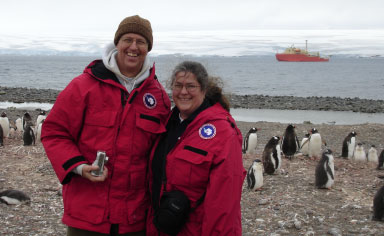|
Looking at the surface waters provides snapshots that may not be communicating what's really going on in the ecosystem. Looking at how the benthic community responds to the changes in phytoplankton will provide a much more systematic picture than what's happening at the surface. "We are starting to see a change in the ecology of the system," says Carrie. "Our study uses the benthos, the animals on the bottom, as an integrator of everything that happens on the surface waters."
The team has established five stations, ranging over hundreds of kilometers. They are looking for characteristics in the benthic ecology at each station, with the idea that as change occurs, the southernmost stations will become more northern-like. "The phytoplankton are changing, and the benthos that are integrating all of the debris floating down will begin to look more like their counterparts to the north," says team member Dave DeMaster, "thus making it possible to document climate change and ecological response to that change in a systematic fashion."


